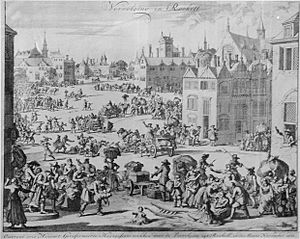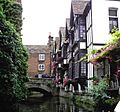Huguenot facts for kids

The Huguenots were a group of French Protestants. They followed a type of Christianity called the Reformed tradition. This group became important in France during the 1500s.
The word "Huguenot" first appeared in France in the early 1500s. It was used to describe members of the Reformed Church of France. These French Protestants followed the Reformed tradition of Protestantism. This was different from the Lutheran beliefs common in parts of Germany. At one point, Huguenots made up about 10% of the French population. However, their numbers dropped a lot after they faced heavy persecution, especially after 1685.
Contents
A Time of Conflict: The French Wars of Religion
By 1562, there were about two million Huguenots in France. Most of them lived in the southern and western parts of the country. As the Huguenots became more influential and showed their faith openly, the Catholic population became more hostile towards them.
What Caused the Wars?
This hostility led to a series of religious wars. These were known as the French Wars of Religion. They happened on and off from 1562 to 1598. The Huguenots were led by important figures like Jeanne d'Albret, her son Henry IV, and the princes of Condé.
How Did the Wars End?
The wars finally ended with the Edict of Nantes. This important agreement gave the Huguenots significant religious freedom. It also gave them some political and military rights.
Losing Rights and Forced Exile
In the 1620s, the Huguenots rebelled. Because of this, they lost their special political and military rights. However, they still kept their religious freedoms granted by the Edict of Nantes for a while.
The Reign of Louis XIV
Things changed greatly under the rule of King Louis XIV. He slowly increased the persecution of Protestants. In 1685, he issued the Edict of Fontainebleau. This new law took away all legal recognition of Protestantism in France. Huguenots were then forced to either change their religion to Catholicism or leave France.
The End of Persecution
By the time King Louis XV died in 1774, French Calvinism was almost completely gone. The official persecution of Protestants finally ended with the Edict of Versailles (also called the Edict of Tolerance). This was signed by King Louis XVI in 1787. Just two years later, in 1789, the Declaration of the Rights of Man and of the Citizen was created. This document gave Protestants equal rights as citizens.
Where Did the Huguenots Go?
Many Huguenots were forced to leave France. They moved to Protestant countries like England, Scotland, Denmark, Sweden, Switzerland, and the Dutch Republic. They also went to parts of the Holy Roman Empire and Prussia. Some also fled to the Channel Islands and Ireland.
New Homes Around the World
Huguenots also traveled further away. They settled in the Dutch Cape Colony in South Africa, the Dutch East Indies, and the Caribbean. Many also went to New Netherland and several English colonies in North America. A few families even went to Orthodox Russia and Catholic Quebec.
Huguenots Today
Today, most Huguenots have blended into the societies and cultures where they settled. However, some communities still keep their beliefs and identity. These include the Camisards in the Cévennes region of France. Also, many members of the United Protestant Church of France and the Protestant Reformed Church of Alsace and Lorraine are descendants of Huguenots. The Huguenot diaspora (people spread out from their homeland) in England and Australia also still hold onto their heritage.
Images for kids
-
Millais' painting, A Huguenot on St. Bartholomew's Day
-
Henry IV, shown as Hercules defeating the Lernaean Hydra (which represents the Catholic League), by Toussaint Dubreuil, around 1600
-
The Huguenot Monument in Franschhoek, Western Cape province, South Africa
-
The Walloon Monument in Battery Park, Manhattan, New York City
-
The Jean Hasbrouck House (built in 1721) on Huguenot Street in New Paltz, New York
-
Houses of Huguenot weavers in Canterbury
-
The entrance to Huguenot Cemetery, Cork in Cork, Munster
-
A relief by Johannes Boese, 1885: The Great Prince-elector of Brandenburg-Prussia welcoming arriving Huguenots
-
François Mitterrand officially apologized to the Huguenots and their descendants on behalf of the French state in 1985
See also
 In Spanish: Hugonotes para niños
In Spanish: Hugonotes para niños
 | Jewel Prestage |
 | Ella Baker |
 | Fannie Lou Hamer |














